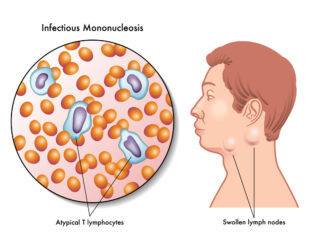
More Senior Health Articles
How Long Is Mono Contagious?

Mono, short for mononucleosis, is caused by an infection with Epstein-Barr virus (EBV), a herpes virus. As with other herpes viruses, EBV stays in your body for the rest of your life, although it wont cause you to get mono again.
Frequently referred to as the “Kissing Disease” because you can catch it from the infected saliva of someone who has the virus, mono can also be contracted by sharing a toothbrush, drinking straw, or eating utensil with someone who has the virus. Overall, mononucleosis is only slightly contagious from casual contacts. Friends, relatives and roommates rarely get it. The person with mono does not need to be isolated.
Once you get the virus, you generally dont have any symptoms for 4-7 weeks. When symptoms begin, youll probably have a fever, sore muscles, headache, sore throat, and loss of appetite. Two indicators that you may have mono and not the flu are being tired all the time and having swollen lymph nodes in your neck, under your arms, and around your groin. Some people also have an enlarged liver and/or spleen. A blood test, known as the Monospot test, can help your doctor determine whether you have mono.
Antibiotics dont cure viral infections, including mononucleosis, but they may be prescribed if you have a complicating bacterial infection. Rest, fluids, pain relievers, throat lozenges, warm salt water gargle, menthol rubs and other home remedies help relieve symptoms. Anti-inflammatory medicines may reduce the pain and swelling of the throat. Corticosteroids can also shrink swollen, tender throat tissues.
As stated above, a symptom of mono is an enlarged or swollen spleen. A blow to the abdomen can cause rupture of an enlarged spleen and bleeding. Therefore all patients with mononucleosis should avoid contact sports for at least four weeks. Athletes especially must restrict their activity until the spleen returns to normal size by physical exam. Constipation and heavy lifting should also be avoided because of the sudden pressures they can put on the spleen.
How long you are contagious is a tricky question because doctors and researchers are not exactly sure. You can spread the infection for the entire time you have symptoms and probably for a few months after your symptoms are completely gone. It may be a good idea not to share drinks for about six months after you start feeling better and to avoid mouth kissing. Remember, that might be how you caught mono in the first place.
Other Articles You May Find of Interest...
- 3 Types of Exercises Best for Seniors With Arthritis
- Independence Boost: How Medical Alerts Help Chronic Conditions
- Over-the-Counter Hearing Aids (OTC)
- Therapeutic In-Home Sauna Service for Homebound Seniors
- Staying Active and Engaged: A Guide to Enhancing Senior Wellbeing
- Technology in Nursing Homes: How Tech is Improving Care and Communication Within Nursing Homes
- Ensuring Bathroom Safety

















